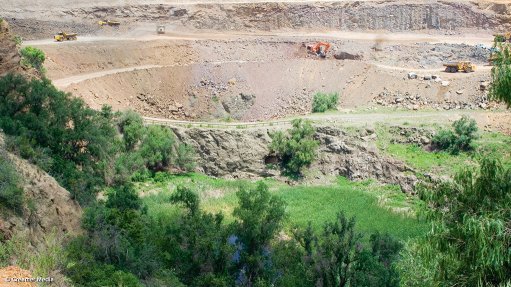
NEMA AMENDMENTS, SAFER ENVIRONMENT
Increased penalties should result in the environment being better protected in the areas affected by mining activities
Photo by: Duane Daws
While recent changes to legislation have not affected the Department of Mineral Resources’ (DMR’s) role as controlling authority in terms of issuing mining environmental authorisations, penalties for noncompliance are greater than what they were under the Mineral and Petroleum Resources Development Act (MPRDA), says law and litigation firm Fasken Martineau environmental department partner Matthew Burnell.
“Increased penalties should result in the environment being better protected in areas affected by mining activities. However, this will only be the case where these penalties are coupled with better enforcement,” he says.
Burnell explains that the provisions relating to mining and the environment were removed from the MPRDA and included in the National Environmental Management Act (Nema) and the Environmental Impact Assessment (EIA) regulations in December last year.
This was done as a compromise between the DMR and the Department of Environmental Affairs regarding the authority responsible for regulating environmental impacts arising from mining activities.
Burnell explains that the two pieces of legislation were always linked in that environmental concerns pertaining to mining operations were governed by the MPRDA but were implemented in accordance with the Nema best practice principles.
However, as the DMR is tasked with the regulation of mineral resources and not the environment, there were always concerns by environmentalists that the impacts of mining activities were not properly monitored and enforced.
Burnell notes that, although the DMR has remained the authority to issue environmental authorisations, the DEA will be the ultimate appellate body in regarding environmental issues.
This recent revision of the mining industry’s environmental regulatory framework has highlighted the relationship between mining companies, environmental groups and communities.
“The public has the power to hold companies accountable for environmental offences,” he states, adding that the public can anonymously report environmental crimes on the DEA-operated national environmental crimes and incidents hotline. If communities believe that mining companies will take responsible action in respect of their activities, they may be less likely to immediately report non-compliances to the authorities.
However, where this social licence to operate does not exist, affected parties may turn to the authorities or the media to vent their concerns, says Burnell, who adds that, as the Nema enables Mineral Resources Minister Ngoako Ramatlhodi to appoint mining-focused environment inspectors, there should be more capacity to investigate and enforce environmental misdemeanours.